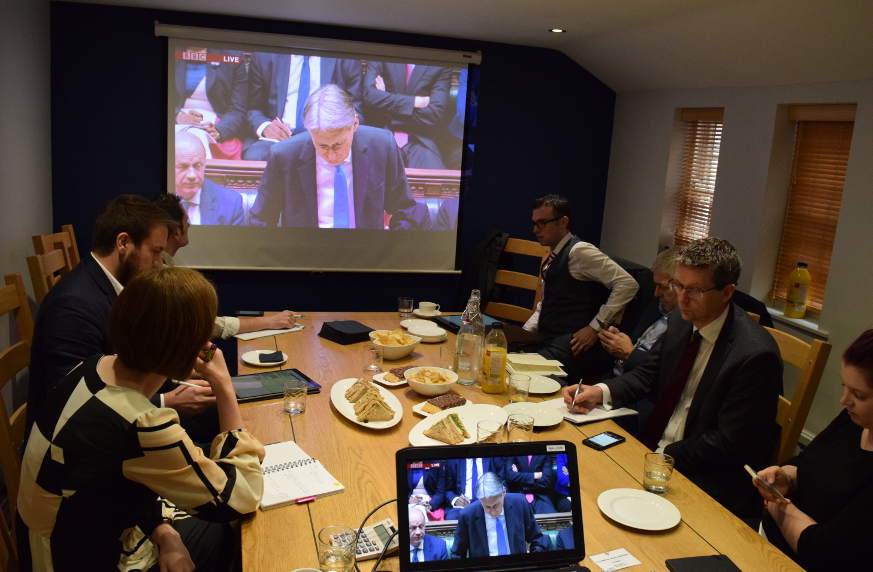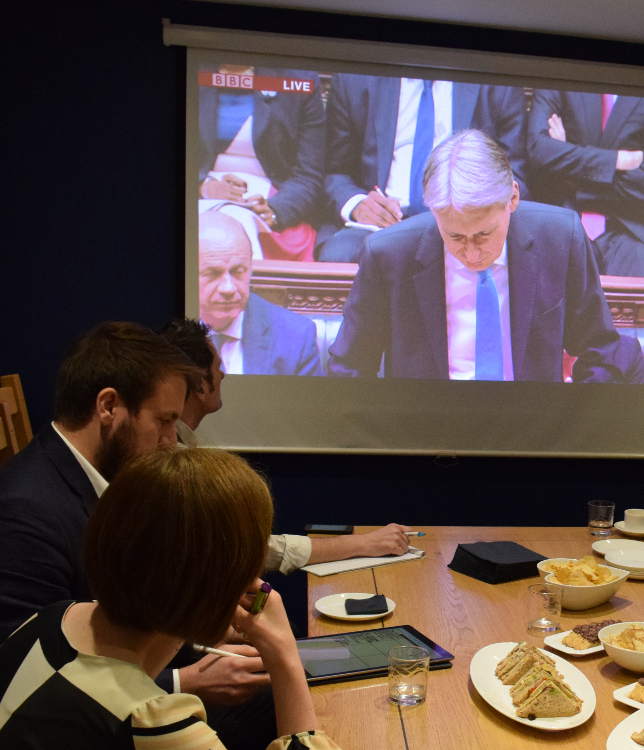Chesterfield businesses react to this year’s budget
‘A balanced budget,’ was the consensus of the panel at the Derbyshire Times Facebook Live round table, organised by Destination Chesterfield.
In a packed boardroom at Mitchells Chartered Accountants and Business Advisers, based on Saltergate in Chesterfield, key figures from Chesterfield’s business, education and social sector, came together to discuss and digest Chancellor Philip Hammond’s Autumn 2017 budget and what it means for both businesses and residents living in north Derbyshire.
Michael Heath, Managing Director of Milestone Financial Planning, commented: “At face value there were no big losers in this budget. However, when the fine print comes out it could all change. No single group has received any punitive levels of tax and young people have benefitted quite nicely. I was surprised there was no mention of pensions though.”
It was an encouraging budget for James Taylor, Managing Director of Roaring Mouse PR, who said: “There was a lot of positive talk about investment in housing, skills and technology.”
Ahead of announcing his Budget pledge, Hammond promised to guarantee a brighter future for the next generation by creating a fairer Britain. It was no surprise therefore to find him addressing housing, the NHS, education and technology as the key drivers of this budget.
Brexit was largely avoided, although Hammond committed to making Brexit negotiations a priority in the weeks and months ahead, saying that already £700m has been invested in Brexit preparations with a further £3bn set aside and more promised if needed.
Concerns were raised by the round table panel on learning that productivity growth has been revised downwards to 1.5% in 2017 from 2% with forecasts decreasing by 0.1% year on year until 2020. However, Britain’s share of debt has finally peaked and the borrowing was lower than the spring budget earlier in the year. Hammond committed to borrowing falling each year to reach its lowest level by 2023.
The chancellor said that the world was on the brink of a technological revolution which Britain was at the forefront He set money aside for emerging technologies to secure its ‘bright future’ and ‘embrace the next industrial revolution.’
A new tech business is founded in Britain every hour. With the investment he hoped this would be increased to every half hour creating high paid, high productivity jobs of tomorrow.
This budget, he said, invested in the infrastructure to support the next generation and in the future of the country. He described it as laying the foundations for a ‘Global Britain’ for a dynamic and innovative economy.
The panel gave their views on the key announcements and what they believe they mean for Chesterfield and North Derbyshire.
On the panel were:
PB: Phil Bramley – Editor, Derbyshire Times
MH: Michael Heath – Managing Director, Milestone Financial Planning
MB: Mark Bennington – Vice Principle of Apprenticeships and Commercial Services, Chesterfield College
GJ: Glenn Jaques – Director, BRM Solicitors
BRS: Beth Robson-Smith – Centre Manager, St Thomas’ Church Centre
LF: Liz Fisher – Tax and Payroll Manager, Mitchells Chartered Accountants and Business
JT: James Taylor – Managing Director, Roaring Mouse PR
Housing
- Stamp Duty abolished for first-time buyers on homes up to £300,000, and on the first £300,000 of properties up to £500,000
- 100% council tax premium on empty properties
- £44bn of capital funding to help build 300,000 homes annually by mid-2020s
- New money for home builders fund
- £630m ‘small sites fund’
- £8bn of financial guarantees to support private housebuilding
- £2.7bn housing infrastructure fund
- £1.1bn for new urban regeneration
- £34m to train construction workers
- A review to be chaired by Oliver Letwin to look at ways to speed up planning permission
- Creation of five new garden towns
MH: The abolishment of stamp duty for first time buyers was a big win.
JT: The price of housing has risen astronomically so anything that helps stimulate the property market at the bottom end should be welcomed.
PB: Are there enough houses available in Chesterfield?
MH: There certainly has to be stock available to buy? The Chancellor has committed to more homes being built and nodded towards ‘multi occupancy’ buildings in urban areas. Is that really what young people/families want?
PB: He also said there was a discrepancy between the number of houses being built and planning permissions granted. Why is that?
MH: It results from a land banking exercise and it has been going on a long time. Developers seek planning permission in order to increase the value of their land. However, the threat of Compulsory Purchase Orders if the land is now not developed quickly enough, will really shake things up.
JT: The small sites fund will also help small independent builders.
Homelessness and Universal Credit
- £1.5bn to remove seven-day waiting period for Universal Credit; new claimants in receipt of housing benefit will get it for two weeks
- £28m in three new housing pilot schemes – in the West Midlands, Manchester and Liverpool – to halve rough-sleeping by 2022 and eliminate it by 2027
PB: Homelessness is a big topic in Chesterfield. The Chancellor announced money to tackle the problem in specific cities. Could this benefit Chesterfield?
BRS: We can certainly look to learn and share Best Practice from these pilot projects, however I would like to see more done to tackle the root of homelessness.
PB: Will the changes to Universal Credit help homelessness?
BRS: it will help people who are at risk of losing their home, however the the process is not quick enough and it is a difficult process. Not having to pay back the money they are borrowing as quickly, is a big positive though.
Business
- Business Rates – £2.3bn cost to bring forward the change to Consumer Prices Index (CPI) from Retail Prices Index (RPI) by two years to 2018
- After next revaluation, future Business Rates revaluations to take place every three years rather than five
- Staircase tax: businesses hit will have original bill reinstated
- Discount for pubs (rateable value less than £100,000) extended by one year to March 2019
- VAT – Current VAT threshold of £85,000 to remain for two years. Chancellor announced a consultation on the threshold at which small businesses pay VAT
- Digital tax -£200m a year extra from income tax on UK sales
- Target £1.2bn a year in lost VAT from online shopping
- Increase to Research and Development expenditure credits to 12%
- Those charging electric vehicles at work will not face ‘Benefit in Kind’ taxes
- Cancelled a planned fuel duty rise
- £2.5bn of investment to kick start the UK’s productivity
- committed to retain the phased reduction of corporation tax
LF: He has stuck to the promises he made around VAT and Business Rates in the election manifesto. However, the digital tax is an attempt to raise money from digital retailers and create a level playing field between them and high street shops. This is good news for high street retailers who are constantly undercut on price by online retailers.
JT: He’s steered away from increasing the VAT threshold, but the consultation would indicate that it’s just been kicked down the line. It’s the same with Business Rates.
GJ: It’s great that the Chancellor has listened to businesses and brought forward plans to switch from RPI to CPI inflation on Business Rates, however local businesses are concerned about Business Rates now.
LF: I agree. Businesses need help now.
PB: The VAT threshold was described as ‘a banana skin dodge’.
MH: After the fiasco around National Insurance in the last Budget, the government can’t afford to do another U-turn, which is why I suspect he put it off.
JT: A lot of VAT stealth measures have already been introduced that businesses are already dealing with.
LF: VAT is so complicated that a lowering of the threshold level would involve many many more businesses that would have far reaching changes.
MH: It would be a huge task and would impact so many businesses. The talk of a ‘consultation’ would indicate that we are not done with the issue of the VAT threshold yet, causing more uncertainty to businesses.
LF: There’s yet another increase on company cars. They are looking less and less attractive to employees unless they’re electric vehicles.
MH: Yes, an electric company car is an attractive option seeing as he has said there will be no benefit in kind tax attached to charging the cars at work. It does make diesel cars very unattractive and this will be reflected in their secondhand value.
LF: The increase in Research and Development credits to 12% is good news for businesses, particularly those in engineering and manufacturing in Chesterfield. The Chancellor sneaked that one in. My concern is that many businesses will overlook this, unless they have adviser working with them.
Education
- £40m for maths teachers; £600 premium for schools for each student taking A level maths
- Triple number of computer science teachers to 12,000; creation of a new national centre for computing
- National retraining scheme for digital expertise
- Extra £20m for colleges to prepare for T-Levels
PB: It seems like it’s maths for everyone. What do you make of funding for maths teachers?
MB: Any investment in 16 – 19 area is very welcome. There is an issue in recruiting and retaining teachers and there is a big gap at the moment that isn’t being addressed. The investment however supports the inward investment in STEM and the digital revolution.
PB: Will the student premium push further education providers to tout for maths focused students?
MB: We welcome the investment but there are bigger things to go at. We hang a lot on maths, but it’s more around the vocation, application and usefulness of maths in a range of jobs.
MH: The Chancellor talked about maths being a route to technology skills which would support his declaration that Britain was on the brink of a technological revolution with driverless cars and 5G technology.
PB: With the money being allocated for T-Levels, the new technical qualifications, would that indicate that the Apprenticeship Levy hasn’t worked and that many companies just see it as a stealth tax?
MB: A lot of employers around the country are still trying to get their heads around the Levy as it is quite complicated. It means that they’re not spending their pot of money and it’s building up. What we’re seeing is those businesses who are spending their Levy pot are looking for level 5 management apprenticeship training.
Technology and Transport
- £400m for electric vehicle charging infrastructure fund
- 1 percentage point increase in company car tax on diesel cars
- From 2018, an increase in tax on diesel cars that don’t meet standards – to go up by one band
- Proceeds to fund £220m clean air fund
- £500m for artificial intelligence and 5G initiatives
JT: The budget measures around transport are not just about looking at driverless cars, they’re about creating growth and opportunities for car manufacturers that are already here as well as attracting investment from others
MB: The electric vehicle charging infrastructure fund should create a lot of opportunities for small businesses in the supply chain.
JT: I welcome money put into 5G alongside the transport infrastructure; this can only boost business. One of Chesterfield’s strengths is its transport network and being able to get into London in two hours by train. If you could reduce that and the time to get to Manchester, it would be fantastic.
MH: Not only being able to get around quicker but also be more productive while you’re getting around would be great and the £160m he has pledged to develop 5G networks is key to that.
Northern Powerhouse
- £1.7bn transforming cities fund designed to improve transport links and promote local growth within city regions
PB: It doesn’t look like there is going to be another devolution deal on the table for Chesterfield anytime soon now.
JT: We’re not at the front of the queue now. It is good to decentralise and give more power to the regions but since pulling out of the SCR deal we are going to be some way down the queue.
MH: Devolution will come at some point and we’ll get involved once people understand what it is and how it can benefit us. We have to embrace the opportunity of devolution and the powers it will give us.
MB: Devolution has been a slow burn and it seems now to be concentrating on travel infrastructure.
PB: Devolution gives accountability of the money locally. Now it will be a land grab amongst local authorities.
MH: People of Chesterfield want to make the decision about how our money is being spent. We’ll never get our own devolution deal and we need to be part of something bigger but the risk is now that we’ll swallowed up by huge cities.




